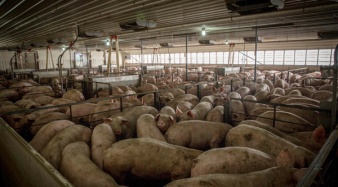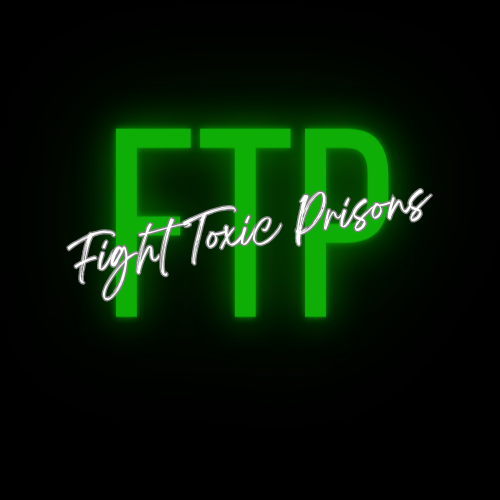Horrific Conditions for Livestock Animals in Texas Prisons Exposed
[FTP Editors’ Note: This article on prison livestock production was originally published online June 2017, and in the Fall 2017 print edition of the Earth First! Journal. We decided to re-post an updated version, as we felt is was an important and under-reported story. In doing so, we also wish to point you to other recent writings of Malik, covering topics including: solidarity with hunger strikers in TX’s Alred Unit, prison water problems, Department of Energy Secretary ties to ETP, prisoner suicide, and more.]
by Keith ‘Malik’ Washington / ComradeMalik.com

My name is Keith ‘Malik’ Washington. I am an investigative journalist, an environmentalist, and human and civil rights activist. I am one of the most outspoken critics of the Texas Department of Criminal Justice. What sets me apart from many criminal justice reporters is my status.
I have been incarcerated in Texas for 10 years. I have been housed on 18 prison units operated by the State of Texas and TDCJ.
I am intimately familiar with the day-to-day operations at the agency.
For years I have written essay after essay which exposes the inhumane conditions forced upon prisoners who find themselves trapped in a Texas prison. However, as an activist, my perspective has expanded significantly.
In 2017, I now see the detrimental impact the sprawling prison system in Texas has on the immediate environment. There is an ecological dynamic here which has been ignored.
TDCJ benefits greatly from being immune to any oversight of any regulatory agency.
This lack of oversight is not just relegated to TDCJ’s agriculture business. Prisoner rights activists have cried out for years for an independent oversight committee which has the authority to enter these prison plantations. Transparency and accountability have not been a part of the TDCJ business or management model. Hopefully, this essay will provoke a much-needed conversation.

Texas prisons (TDCJ) operate an extremely lucrative agriculture business which includes vegetable crops, cattle, hogs, and chickens. I have written extensively about Texas Correctional Industries and the exploitation of free prison labor in Texas. I have drawn the connection between profits and the corrupt parole system in Texas.
We all know good time and work time credits mean nothing to Texas prisoners–-we are slaves and forced into a life of perpetual involuntary servitude.
But what if I told you the state of Texas and TDCJ have established a multi-million dollar agribusiness which subjects animals to horrific and cruel conditions which would shock the world? Would you remain silent? Allow me to give you a glimpse of hell…
Welcome to Wynne Farm!
In February 2014, I was released from long-term solitary confinement (ad-seg). I did 22 months in a very small cage. I was released to the general population on the Wynne Unit, aka the Wynne Farm, located in Huntsville, Texas.
Wynne Unit is the headquarters of numerous TX Correctional Industries (TCI) light industrial factories and it has a large agriculture element which is maintained by prisoners.
The crops, which include corn, peas, watermelon, squash, and green beans, to name a few, are cultivated by prisoners on medium custody.
I was assigned to medium custody for 6 months at the Wynne Farm in 2014. I went into those fields to work outside the gate 3 – 5 days a week.
In close proximity to the fields at Wynne Farm is a large egg-laying operation. And this is where I caught my first glimpse of modern-day animal cruelty in Texas prisons.
I smelled the large hen warehouse before we actually got right up on it.
It was May 2014, a beautiful day outside. The building was made of grey metal and aluminum. It was an old building. As I looked inside, I saw numerous cages. Hens were packed like sardines. Underneath the cages were virtual mountains of bird feces.
The egg-laying hens were packed in these feces-filled cages. I saw dead birds in the cages–some were green–obviously very sick and shaking badly.
The cages are so small, hens cannot turn around or spread their wings. Our job was to remove the fecal matter. The smell of ammonia was very strong. Some birds I noticed had burns on their feet and legs from being housed in filth.
After doing a vast amount of research, I learned that the cages TDCJ uses on Wynne Farm are called “battery” cages. They are typically less than half a square foot of floor space per bird, but TDCJ goes far beyond any industry standard and stuffs in two or three.
Many birds at Wynne die of asphyxiation and dehydration. Decomposing corpses are found in cages with live birds every day at Wynne.
One hideous presence I saw at Wynne Farm were large well-fed vultures. These carrion-eater sit in large groups on top of the hen building at Wynne. It’s hard to miss them and it is a telltale sign that something is very wrong there.
I recommend that independent investigators demand to be allowed on the Wynne Farm immediately.
Animal abuse and toxic water at Coffield and Eastham?
I spent some time on Coffield Unit last year which is located in Tennessee Colony, Texas. There are 3 large units in the area which raise hogs. I can tell you that the pigs on Coffield, Michaels, and Beto Unit are subjected to abuse.
I have gathered firsthand reports of pigs being kept on concrete slabs which create deformities of pigs’ legs. Pigs like to root and dig in the dirt and mud and this staging on concrete obviously prevents that.
But I discovered something quite shocking about TDCJ’s various hog and cattle operations.
While housed at Coffield Unit, I learned that large quantities of coliform bacteria were regularly found to be present in the water system. I’ve discovered raising animals for food causes more water pollution in the US than any other industry. Globally, animals raised for food produce approximately 87,000 pounds of fecal matter per second. That’s 130 times the excrement of the entire human population.
Much of the waste from factory farms like those TDCJ operates as well as pig slaughterhouses like the one on Michaels Unit produces toxic runoff which contaminates streams, rivers and ground water.
Toxic water is a pervasive and systemic problem in the entire state of Texas. So not only is TDCJ abusing animals, it continues to be a major polluter of our environment.
Recently, I learned Eastham Unit has a similar egg-laying operation and I received details. The operation produces approximately 80,000 eggs per week. It is a 24-hour-a-day operation, the lights never go out.
TDCJ makes approximately $100,000 a week just from the eggs here at Eastham.
Eastham also has 3,000 hogs, 600 sows, and it ships for sale 21 piglets a week. I have a word about accuracy in reporting. I cannot tell you what the conditions are like for the birds at Eastham Unit nor can I tell you how the hogs are treated.
No matter how much evidence we produce or how many thought-provoking questions we ask, the Agency of TDCJ will continue to misinform the public and violate the public’s trust.
The time to act is now!
We must seek out the companies doing business with TDCJ’s agribusiness and then expose them and boycott them.
First, we contact the Freedom of Information Foundation for Texas and request their help in finding out who us buying eggs and hogs from TDCJ. Then we respectfully ask these companies to stop doing business with TDCJ until the agency cleans up their act.
Texas will not listen until we start affecting their bottom-line profits; that’s the language the system understands.

Our cries for humane conditions for humans have been routinely ignored–-here is an example: Prisoners housed in Ad-Seg don’t work and it costs a lot to house us in solitary. Many prisoners have died on account of the deadly extreme heat in Texas prisons. Young pigs are vulnerable to extreme heat. Young piglets generate profits for TDCJ.
A couple years ago, TDCJ invested $175,000 for a cooling system for the pigs. The pigs are being preserved for slaughter so TDCJ can benefit. TDCJ does not have any concern for animal rights or human rights. Its main focus is profits by any means.
It is time we take a closer look at what is really going on inside Texas prisons. As activists who are on the “front lines,” we have a duty to confront those entities who abuse and mistreat animals as well as pollute our precious water supplies.
I can only ask that you amplify my voice so that it is heard beyond these walls. I will continue to struggle.
————————-
 Keith ‘Malik’ Washington is a co-founder and chief spokespersyn for the End Prison Slavery in Texas Movement, a proud member of the Incarcerated Workers Organizing Committee and he is the Deputy Chairman of the New Afrikan Black Panther Party (Prison Chapter). Malik has been instrumental in calling for the abolition of legalized slavery in Amerika and is very active in the Fight Toxic Prisons campaign. You can view his work at comrademalik.com or you can write him directly at:
Keith ‘Malik’ Washington is a co-founder and chief spokespersyn for the End Prison Slavery in Texas Movement, a proud member of the Incarcerated Workers Organizing Committee and he is the Deputy Chairman of the New Afrikan Black Panther Party (Prison Chapter). Malik has been instrumental in calling for the abolition of legalized slavery in Amerika and is very active in the Fight Toxic Prisons campaign. You can view his work at comrademalik.com or you can write him directly at:
Keith ‘Comrade Malik’ Washington TDC #1487958
Eastham Unit
2665 Prison Rd. #1
Lovelady, Texas 75851


Leave a comment